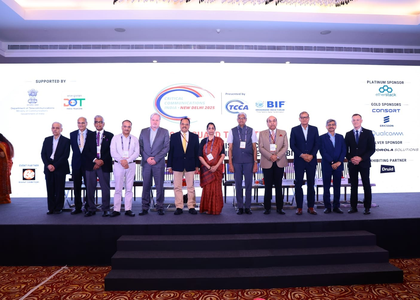Govt focused on critical communications system to counter climate disasters: TRAI Chairman
By IANS | Updated: August 22, 2025 18:35 IST2025-08-22T18:27:00+5:302025-08-22T18:35:18+5:30
New Delhi, Aug 22 TRAI Chairman Anil Kumar Lahoti on Friday said the government is developing policies and ...

Govt focused on critical communications system to counter climate disasters: TRAI Chairman
New Delhi, Aug 22 TRAI Chairman Anil Kumar Lahoti on Friday said the government is developing policies and infrastructure to build integrated, secure national mission-critical communication systems to counter unpredictable climate disasters.
“This subject carries immense strategic importance for both India and the global community as we navigate an era of rising climate vulnerabilities leading to natural disasters, challenges related to communications in managing urban environments and the increasingly complex security situations,” TRAI Chairman said while addressing at a conference here, organised by the Broadband India Forum (BIF) and The Critical Communications Association (TCCA).
"In preparing for uncertainty, communication becomes our strongest weapon. Investing in interoperable, mission-critical networks is important for us to safeguard lives with speed, clarity, and confidence," said Lt. Gen. Syed Ata Hasnain (Retd), National Disaster Management Authority (NDMA) Board Member.
The event saw participation from leading international organisations and speakers, including Kevin Graham, CEO of TCCA, who highlighted the need for India to adopt global standards.
There are profound global lessons that countries like India can incorporate to enhance their emergency preparedness, Graham said.
BIF Chairperson Aruna Sundararajan called for synergy between policymakers, regulators and industry leaders to build technologies and policies that can deliver real impact.
Earlier this month, TRAI issued the Manual for Rating of Properties for Digital Connectivity, the country’s first standardised framework to evaluate how effectively buildings are equipped for high-speed, reliable digital access.
With more than 80 per cent of mobile data consumed indoors, and high-frequency band signals of 4G and 5G often weakened by modern-day building materials, robust in-building networks have become essential for work, education, healthcare, and daily digital services.
Weak indoor connectivity directly affects consumer experience and overall quality of service.
“In the 21st century, digital connectivity is not a luxury — it is essential infrastructure, just like electricity or water. Today, it powers growth, innovation, and opportunity. This framework is a decisive step towards making every building in India ready for the Digital India vision, enabling more citizens to participate fully in our connected economy and laying the foundation for inclusive national growth,” said Lahoti.
Disclaimer: This post has been auto-published from an agency feed without any modifications to the text and has not been reviewed by an editor
Open in app